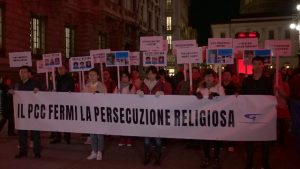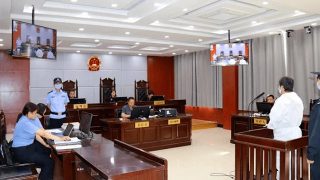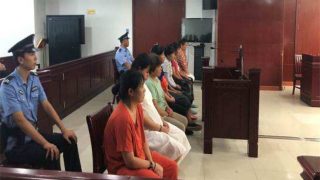Dr. Cristina Calvani, who graduated with the first dissertation internationally on the refugees of The Church of Almighty God, discusses with Bitter Winter their legal situation in Italy and why it is often difficult for them to be granted asylum.
Massimo Introvigne
Dr. Cristina Calvani graduated on October 29, 2018, in Social Anthropology at the University of Perugia, Italy, successfully defending a dissertation on “Religion-Based Chinese Asylum Seekers in Italy: The Church of Almighty God.” The equivalent of an M.A. dissertation (which in Italy allows the graduate to use the title “Doctor” legally), Calvani’s is the first academic exploration internationally of the problems encountered by the refugees of The Church of Almighty God. Her research has implications well beyond Italy, as Chinese refugees tend to encounter similar problems in a number of different countries.
The Italian system dealing with asylum seekers starts (or started, since a new law will soon come into effect and change the present situation) with the so-called hotspots and the SPRAR (System of Protection for Asylum Seekers and Refugees). Can you explain how it works and why this system has been criticized?
The hosting process of the refugees in Italy is based on two levels. The first level of hosting is implemented immediately after the asylum seeker has set foot on the Italian ground. It accompanies the refugee to a specific facility called “hotspot,” created in Europe to sustain and ease the task for the countries exposed to important migratory flows. Inside the hotspots, the refugees are swiftly identified, registered, fingerprinted, and also a health check is carried out. Inside the hotspot, refugees are informed about their rights and of course of the possibility of claiming international protection.
The second level of the hosting process is (or was) the so-called SPRAR and consists in a series of facilities for the refugees, like, for example, meals and boarding, legal advice, linguistic and cultural mediation, social and job orientation, in order to help them achieving self-sufficiency as soon as possible.
Unfortunately, the hotspot and SPRAR systems are often not fully functional, mostly because of lack of personnel with the specific linguistic skills required for these situations. For example, these facilities are not prepared to deal with Chinese that arrive in Italy by plane. It often occurs that the SPRARs have no fundings and their role is taken up by the NGOs, but sometimes the number of asylum seekers is too high to be handled by NGOs. And, as you mentioned, SPRAR’s role will be further reduced by the new law. Only those who have already obtained the international protection would be allowed to use the SPRAR services. The others will be sent to the ordinary “reception centers” for migrants.
In your dissertation, you mention translation problems for Chinese asylum seekers. How serious are they?
In the interviews I did for my dissertation, the operators of the NGO “A Buon Diritto” discussed the many problems they encounter while giving assistance to Chinese asylum seekers. The linguistic and communication ones are certainly the most important. For example, they told me about a specific episode where they had to use Google translator to compensate for the lack of preparation in Chinese—and we all know that Google translator isn’t one of the most reliable ways of translating. The result was hilarious, as Google translated into Italian the word “asylum” based on its meaning (in both English and Italian) as “mental hospital.” The final translation was that the words of a refugee from The Church of Almighty God, “I seek asylum in Italy for religious reasons,” were translated by Google as, “I seek a religious mental hospital in Italy.” Hilarious indeed, but also a cause of concern for the total inadequateness of the Italian operators in handling the requests of Chinese asylum seekers on religious grounds, a new phenomenon in Italy. Their arrival on our territory has caught unprepared all of those working in the hosting process, mostly for language reasons.
You mention that the number of Chinese asylum seekers in Italy is growing. How significant is this trend?
The Chinese seeking for asylum on religious grounds in Italy are a recent phenomenon. However, since 2015, the year of the beginning of this flow, the number has been growing significantly. The UNHCR Global Trends estimate that the number of Chinese asylum seekers, in general, had already increased fivefold from 2010 to 2015. Despite the problems about the interpretation of this phenomenon, the number of Chinese who achieved the refugee status in Italy increased too between 2011 and 2016, a clear sign of the fact that Italy had acknowledged the issue. However, the most recent statistics show an important reversal in this trend, highlighting that in the last two years 88% of the requests have been denied by the Commissions. This means that only one Chinese asylum seeker out of ten obtains some form of protection. As a consequence, Chinese asylum seekers are diminishing, maybe because they get discouraged by frequent rejections and prefer to remain in Italy illegally without seeking asylum. In fact, in 2017, the Chinese in the official statistics are included in the “others” category, as if they were a residual item. These last figures are indeed significant: some of the lawyers I interviewed noted the severe shortcomings of the Commissions, and their unwillingness to explore in depth the issues as the main causes for the rejections. Others mention specific political guidelines as the real cause, based on the government’s general idea that Italy has too many refugees already.
Why dealing with Chinese asylum seekers is somewhat more difficult for Italian authorities, in comparison with refugees fleeing other countries?
Lawyers and NGO operators have found more difficulties with asylum seekers from China, especially because China before 2015, the year in which the first migratory flows of Chinese asylum seekers for religious reasons were noticed in Italy, was somewhat unknown to the authorities dealing with refugees, despite the fact that a few Chinese had been granted protection. In fact, Asia was represented for them almost only by asylum seekers from Pakistan and Afghanistan, whose cultural, political and social context was well-known. The Church of Almighty God, in turn, was absolutely unknown. Thanks to the studies conducted by academics about China and The Church of Almighty God, the situation has now improved, but many problems and misunderstandings remain.
What is the role of the NGOs in dealing with Chinese refugees seeking asylum in Italy for reasons of religious persecution?
The NGOs play a fundamental information and assistance role. An example is the NGO I already mentioned, “A Buon Diritto,” an association based in Rome that has established several information points around the city, where refugees and migrants, including Chinese asylum seekers, come seeking help every day. The NGOs carry out various essential activities, including giving useful information (such as the steps to follow for getting international protection), offering free legal assistance, and also psychological support, which may be important for asylum seekers in order to overcome their traumatic past experiences. This last activity is also relevant for lawyers who, knowing more about the past sufferings of the refugees, may help them obtain the protection they seek.
According to my own statistics, as of the end of October 2018, The Church of Almighty God had 724 asylum seekers in Italy, the third largest group after the United States and South Korea. Based on the research you carried out for your dissertation, why do they leave China and come to Italy?
Many Chinese escape from China to seek protection for religious reasons, because they are persecuted in their country for the religion they practice. This is typically the case of The Church of Almighty God. It is a new Christian religious movement, included in the list of xie jiao by the Chinese government. As your readers certainly know, the Chinese government considers the xie jiao as “evil cults” dangerous for the society and its security, and they are prohibited and banned in China. The Chinese system formally recognizes and guarantees religious freedom, but in reality what happens against the believers of The Church of Almighty God is terrible: they report being persecuted, arrested, and tortured.
To escape this hard repression and freely practice their religion, these refugees are even prepared to leave their families. They come to Italy because getting a tourist visa to Italy is comparatively easy. Of course, in order to get a visa, you need a passport. Sometimes, their identity as members of the Church was unknown to the police, so they had no trouble in obtaining a passport. Sometimes, they used aliases, were arrested with one name and got the passport under another name. The fingerprint and biometrical data base in China should theoretically prevent this, but the system does not work perfectly. And sometimes, they manage to get a passport illegally, as it is well-known that corruption is rampant in China and personnel ready to deliver a passport in exchange for money is not really hard to find.
Can you explain the difference between asylum and “subsidiary protection” in Italy, and why you argue in your dissertation that members of The Church of Almighty God should obtain at least subsidiary protection?
In Italy, there are, or were, three types of protection: refugee status, subsidiary protection, and humanitarian protection. The latter was a residual category and has been abolished by the law passed last month.
The first, refugee status, is the highest protection: it lasts five years and guarantees the same rights in terms of study, work and health assistance enjoyed by Italian citizens. Subsidiary protection is granted when the Commissions did not come to a conclusion whether refugee status should be granted, yet they recognized that the asylum seeker lived in a situation of fear and was at risk of being sentenced to heavy penalties, including death, or tortured if he or she would return home. Humanitarian protection was given to all those, including some Chinese members of The Church of Almighty God, who were regarded as being in a situation of “particular and temporary vulnerability.” However, humanitarian protection will now disappear.
In my interviews, the lawyers persuasively argued that the members of The Church of Almighty God should be granted at least subsidiary protection because they are constantly and sincerely afraid of being threatened and persecuted, often showing distrust in other Chinese for fear of being reported to the Chinese government. This feeling of fear fits perfectly with the subsidiary protection requirements. Of course, lawyers first seek full refugee status, based on the persecution of The Church of Almighty God in China.
Each refugee seeking asylum is interviewed by a Territorial Commission. Who sit in these commissions and how do they work?
The interview by the Territorial Commission is the most important phase of the asylum process because it decides whether the asylum seeker can obtain international protection.
Before 2018, there were four members sitting in the Commission: one from the Ministry of Internal Affairs appointed by its local representative (“Prefetto”), one from the police, one from a local administrative authority, and one from UNHCR (the UN Refugee Agency). However, with this structure, the Commission was not able to provide a professional and homogeneous assessment of the cases, because the members did not have an adequate preparation in this domain. In fact, they often denied international protection to asylum seekers based on wrong motivations.
From July 2018, a new law changed the composition of the Commission: there are still four members sitting, but now two of them are qualified for the task and chosen through a public competition, and the other two come from the UNHCR and the Ministry of Internal Affairs.
In my interviews, lawyers uniformly complained that the members of the old Commission did not examine thoroughly the cases during the interviews with the asylum seekers. The lawyers hope that the new composition of the Commissions may eventually solve this problem.
Whom did you interview about the cases involving The Church of Almighty God’s refugees?
I interviewed several people deeply involved in the Italian cases of the refugees from The Church of Almighty God. They included several lawyers from Perugia and Rome, a judge from the Court of Rome, and the NGOs’ specialized operators. I acknowledge a limitation in my dissertation. I tried to interview the members themselves of The Church of Almighty God, but this proved impossible. I would say that this problem became part of the raw material I worked on. I am persuaded this lack of trust is often caused by the fear of being betrayed and reported to the Chinese authorities. I plan to go on studying these refugees and hope I will be able to interview some of them in the future.
Based again on my own statistics, as of October 2018, only 69 out of 724 asylum seekers from The Church of Almighty God in Italy were granted refugee status. In your dissertation, you mention four reasons why many requests for asylum by members of the Church are not granted. Let’s discuss each of this, explaining the objections more in detail, together with the critical remarks you offer in the dissertation…
The interviews with the lawyers in Perugia and Rome showed that most requests to obtain international protection filed by the members of The Church of Almighty God are rejected by the Territorial Commissions for four main reasons. Some decisions of the Commissions are then reversed by the Justice Courts and protection is granted. But why do the Commissions reject the applications in the first place?
First of all, because the Commissions argue that the refugee’s personal history is not credible. But how they come to this conclusion is questionable. The Commissions base their alleged knowledge of The Church of Almighty God on what they call COI (Country of Origin Information). Many Commissions consider only the COI included in the database Refworld, which is managed by the UNHCR. It is normally a good database. But unfortunately, as scholars have demonstrated, the information about The Church of Almighty God in Refworld is outdated, and some COI simply echo Chinese propaganda.
Secondly, it has often been emphasized by the Commissions that the refugees from The Church of Almighty God do not know their own religion. I see two problems here. One, the Commissions once again compare the refugees’ answers to the COI, but the COI often present a distorted view of the theology of The Church of Almighty God. Two, the Commissions are conditioned by a religious vision deriving from their Western mentality and the fact that many in Italy are familiar only with one religion, Roman Catholicism. For some members of the Commissions, it is very difficult to understand the theology of a Church believing that Almighty God came to Earth in our time and incarnated as a woman.
The third point discussed by the Commissions concerns the travel documents obtained by the Chinese asylum seekers. Some Commissions argue that it is not credible that members of The Church of Almighty God, who are always pursued and controlled by the Chinese police, may obtain a passport without any difficulty. We have already discussed this objection.
Fourthly, some Commissions believe that there would be no particular risks for these Chinese asylum seekers in returning to China. All scholars who have studied The Church of Almighty God disagree. If the asylum seekers would return to China, they would be arrested or worse. We can only conclude that the reason for these rejections by some Commissions was the lack of preparation of their members, who often carried out their examination activities superficially and did not explore issues in depth.
What can be done by lawyers and NGOs to improve the chances for CAG refugees to be granted asylum in Italy?
First of all, it is useful that all those involved in the asylum seeking process familiarize themselves with the academic literature about The Church of Almighty God. Indeed, this is already happening. It is true that only 9.5% of the asylum requests by members of the Church have been granted in Italy so far, but most of the favorable decisions are recent and came after the lawyers started using the most updated scholarly literature in their cases.
My interviews have also evidenced the need for these asylum seekers to be assisted at their arrival in Italy by a specialized medical team capable of recognizing torture wounds and signs; by psychologists, who would be able to detect traumas caused by the persecution and the journey out of China; by anthropologists experienced enough to mediate the great cultural differences between Italy and China. In this way, lawyers and NGOs together would be able to promote the asylum seekers’ awareness of their own history, a very important aspect for obtaining international protection.
Source: Bitter Winter / Massimo Introvigne




